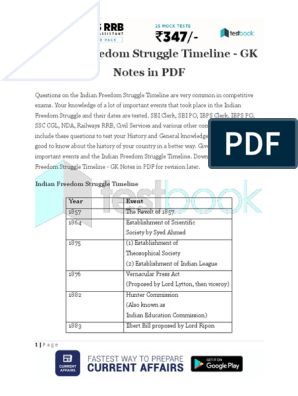0% found this document useful (0 votes)
74 views2 pagesIndian National Congress History
This document outlines several key developments in the Indian independence movement between 1905-1940:
1) The Indian National Congress passed proposals for independence and to boycott the Simon Commission in 1927 and discussed fundamental rights and economic policy in 1931.
2) Subhash Chandra Bose defeated Gandhi's candidate for Congress president in 1939 but later resigned.
3) A number of influential nationalist leaders and organizations emerged, including Bal Gangadhar Tilak, Bipin Chandra Pal, and Aurobindo Ghosh of the extremist wing of the Congress.
Uploaded by
Pradeep RajasekeranCopyright
© © All Rights Reserved
We take content rights seriously. If you suspect this is your content, claim it here.
Available Formats
Download as DOCX, PDF, TXT or read online on Scribd
0% found this document useful (0 votes)
74 views2 pagesIndian National Congress History
This document outlines several key developments in the Indian independence movement between 1905-1940:
1) The Indian National Congress passed proposals for independence and to boycott the Simon Commission in 1927 and discussed fundamental rights and economic policy in 1931.
2) Subhash Chandra Bose defeated Gandhi's candidate for Congress president in 1939 but later resigned.
3) A number of influential nationalist leaders and organizations emerged, including Bal Gangadhar Tilak, Bipin Chandra Pal, and Aurobindo Ghosh of the extremist wing of the Congress.
Uploaded by
Pradeep RajasekeranCopyright
© © All Rights Reserved
We take content rights seriously. If you suspect this is your content, claim it here.
Available Formats
Download as DOCX, PDF, TXT or read online on Scribd
/ 2





































































































